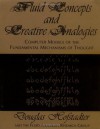251
Followers
4
Following
Manny Rayner's book reviews
I love reviewing books - have been doing it at Goodreads, but considering moving here.
Currently reading
The Greatest Show On Earth: The Evidence For Evolution
R in Action
Fluid Concepts and Creative Analogies
McGee on Food and Cooking: An Encyclopedia of Kitchen Science, History and Culture
Epistemic Dimensions of Personhood
Pattern Recognition and Machine Learning (Information Science and Statistics)
Relativity, Thermodynamics and Cosmology
The Cambridge Handbook of Second Language Acquisition
 It's easy to nitpick A Short History of Nearly Everything. Bryson, by his own cheerful admission anything but a scientist, makes a fair number of mistakes. He says that all living creatures contain hox genes; he omits Alexander Friedmann and George Gamow from his description of how the Big Bang theory was developed; when talking about Darwin and Paley, he doesn't seem to be aware that Natural Theology was one of Darwin's favorite books and had a huge influence on him. Those are just a few of the glitches I happened to notice. I'm sure a real expert would have spotted many more.
It's easy to nitpick A Short History of Nearly Everything. Bryson, by his own cheerful admission anything but a scientist, makes a fair number of mistakes. He says that all living creatures contain hox genes; he omits Alexander Friedmann and George Gamow from his description of how the Big Bang theory was developed; when talking about Darwin and Paley, he doesn't seem to be aware that Natural Theology was one of Darwin's favorite books and had a huge influence on him. Those are just a few of the glitches I happened to notice. I'm sure a real expert would have spotted many more.But so what? The author is incredibly entertaining, and I came across dozens of great stories from the history of science. He has done a fantastic job of tracking down details that you won't find in the other books! Continuing with Darwin, everyone's heard about the evolution debate between T.H. Huxley and Samuel Wilberforce; this was the dozenth time I'd seen Huxley's contemptuous reply to Wilberforce's question about whether he claimed descent from a monkey though his grandmother or his grandfather. But I'd never before read that Lady Brewster fainted, or that one of Darwin's Beagle colleagues wandered through the crowd, holding a Bible aloft and shouting "the Book, the Book!" Similarly, everyone tells you that Newton only published the Principia after Halley persuaded him to do it. But I hadn't heard that Newton intentionally made it as difficult as possible to read because he didn't want amateurs bothering him, or that Halley's reward was to be told by the Royal Society that since they could no longer afford to pay his salary in pounds sterling, he would instead be given remaindered copies of The History of Fishes.
And there were numerous other stories I'd never seen at all. If you don't find plenty here to amuse and instruct, you're either encyclopedically well-read in all branches of science or you have no interest in it whatsoever.











